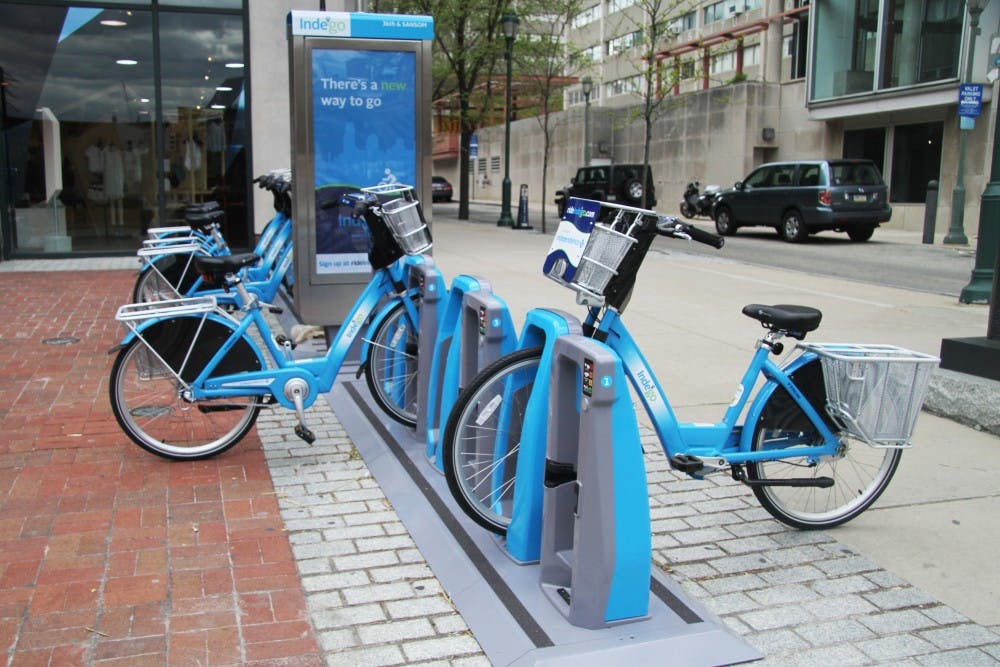With a number of cities across the country implementing bike share programs, Philadelphia is following suit.
This past Friday, the city of Philadelphia rolled out their new Indego bike share program, sponsored by Independence Blue Cross. “Bike share is a new way to move around the city,” Program Director and Manager of Strategic Initiatives in the Philadelphia Mayor’s Office of Transportation & Utilities Cara Ferrentino said. Currently, there are 70 stations located from Temple University down to Tasgar St., as well as from 44th St. to the Delaware River.
The program launch was held at Eakins Oval in front of the Philadelphia Art Museum. Remarks were made by Mayor Michael Nutter and sponsor Independence Blue Cross, before a celebratory ribbon cutting. A parade was held around the oval, and 300 riders set out from the oval to jump start the Indego program, Ferrentino said.
A team from Penn participated in the launch, Director of Communications and External Relations in Penn’s Department of Business Services Barbara Lea-Kruger said in an email. They rode bikes from downtown to one of the stations on Penn’s campus outside Urban Outfitters on the corner of 36th and Sansom Streets.
In addition to the station outside Urban, there are two other stations located on Penn’s campus. One is on 40th St., between Spruce and Locust Streets, outside the Dental School. The other is near the University City Regional Rail station located next to Franklin Field off of South St.
“The University’s Bike Committee is pleased to be at the start of this exciting venture. With three stations located on campus, and several more within a few blocks from our boundaries, this program aligns with Penn’s commitment to its Climate Action Plan and sustainability,” chair of Penn’s Bike Committee and Associate Director of Penn Transit Services, Matthew Brown said. “It is a great addition to our multi-faceted transit program that helps our community travel to, from and around campus.”
“The program is meant to be affordable for students,” Ferrentino said. Indego offers three membership options. For $15 a month, users can take an unlimited number of one hour trips within that period. There is also a flex pass option, which allows users — for $10 per year — to take an unlimited number of $4 one hour trips within the year. Otherwise, a one time use costs $4 per half hour.
By comparison, New York City’s bike share program costs $9.95 plus tax for all-day use.
For riders who don’t see themselves using Indego that often, they can try the program whenever by walking up to a station and paying with credit or debit.
“Indego becomes a new way to get to different parts of the city,” Ferrentino said. “We’re excited to see how people will be creative with this type of stuff.”
College freshman Max Wengyn thinks bringing the Indego bike share program to campus is a good idea, citing a cut down on people using taxis and reducing congestion as potential effects.
“You may not need a bike all of the time, so it wouldn’t warrant you having your own. However, if a situation were to come up that would warrant you needing a bike, [Indego] would streamline the process of getting one,” Wengyn said.
Engineering freshman Hans Stedman also approved of the program. An aspect he likes particularly is the fact that you can get a bike at one station and park it at another station.
Wengyn and Stedman, both owners of bikes on campus, don’t see themselves using Indego, but they recognize there are situations where taking advantage of the bike share program would be a good idea.
On busy days, Wengyn believes that using the bike share program could cut down on travel time for students who do not have bikes on campus. Additionally, if a group of friends wanted to take a bike ride one day, perhaps along the river, but they didn’t all have a bike on campus, using Indego would be perfect for this, Wengyn said.
Although students recognize that Indego is a good program for the city of Philadelphia to implement, they don’t envision it having a substantial impact on campus life. “I don’t see it being used a lot,” Stedman said.
Bringing Indego stations to campus has been the result of collaboration between the Division of Business Services, Facilities and Real Estate Services, the Division of Public Safety, Student Health Services, Penn Cycles and Penn Bike Commuters, a press release from Penn’s Department of Business Services said.



